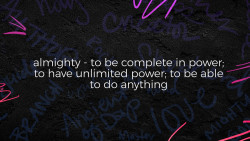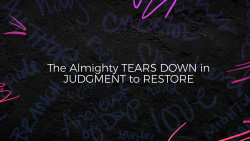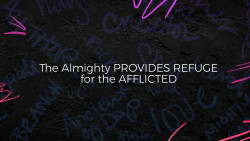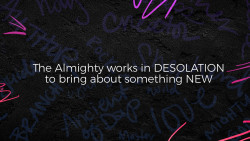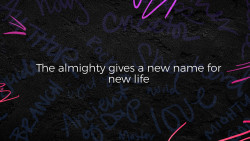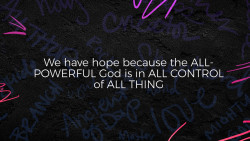What's in a Name? - Part 2
Sunday message.
In this message, Pastor Jamie shares how God provides refuge during difficult seasons while working to bring about something new, just as He gave Abraham a new name and identity.
MP3 Audio
MP3 Transcript
View an A.I. generated full transcript of the audio.
Good morning, everyone. I don't know any other way to, like, get a service started in that today, Right. Years ago, a few. About a year and a half ago, we. We had a campaign where we put a bunch of ping pong balls up here on the table.
Remember those? They were numbered one to a hundred. And occasionally people come up, say, hey, what number are we on since we started that? Because the point of it wasn't that we would say we reached 100. The point of it was that number 25 represented someone lost, saved, and committing their life to Christ.
And so as time has passed, we've asked you, if you. When those numbers come up, to bring the ball back, sign it, because I'm putting them in a big jar. I'm gonna do something special with them when we do get to 100. But today, that reached number 50. And so if you have a ping, you still have your ping pong ball.
I know where ours are. In fact, we were supposed to get them this morning because we were, what, 47 and 45 and 47. So today, 45 and 47 came through, and already Laura's like, well, who lined up with which one? And so it's like, it makes it personal. And so if you've got 51 through 100, keep on praying.
Because I know that God is bringing about things. You know, I was inspired by a friend of mine who's actually in this room today. Did not ask her permission to share this, but I was watching a reel on Friday, and she reminded me of something I think we all need to be reminded of in the context. She was talking about how, you know, when we reflect on a week, like we've just had, a lot of us would be like, you know what? Maranatha.
Come, Lord Jesus, right? Let's come on. Come on back. We're. We're tired of the suffering.
We're tired of the pain. Just put the bow in the box and let's be done. But then she said she felt convicted to pray that merciful prayer. But God, give us one more day. One more day for one more soul, for one more person, you know?
And this week, there has been a lot of tragedy. I think about Erica and those two young kids who lost their dad tragically. I think about the family of that young lady who was stabbed on the subway. I think about that school shooting. But you know why we think about those?
Because they were public. We're not talking about the private sorrows and tragedies that are going on all around us, are we? They're all around us there are people who are hurting, there are people who are afraid, and there's people that are angry. Could we stop right now and just pray for our country? Can we just pray for peace?
Can we pray for level headedness? Can we pray for the rhetoric across the board to tone down? And can we come together under the blood of Jesus Christ as the family of God? Father, as we get ready to open your word today, God, we need your peace, we need your power, we need your comfort. And I just pray, oh God, as we sit in here today, that your spirit would knit us together as one.
As we're crying out across our nation for you to knit us together as one. That in the midst of loss, that there would be peace, that in the midst of tragedy, that there would be comfort in the midst of anger, that there would be resolution, in the midst of fear, that there'd be courage. God speak to us today and lead us and speak to our hearts on how we can live out the kingdom of God in, in this world right now and for the days to come. Lord, we love you. In Jesus name, Amen.
So we're continuing this series today called what is in a Name. And last week I talked about Jehovah Jireh, Yahweh Jireh, from the story of the offering of Isaac and how God has God is and God will continue to provide for you and me. He provides all that we have, the breath that we breathe, the food that we eat. But primarily God has provided for us an eternal reward for those of us that would trust Jesus Christ as our Lord and Savior. You see, he's not got a ram sitting out in the field for you.
He's got a savior who died on a cross to take your sin away. And so we celebrate that today. And I'm going to ask you to turn a little bit backwards in Genesis to 17, chapter 17. And when you get it, just go ahead and stand. And let's read this narrative.
This is God coming again to Abraham to remind him of his promises and again reaffirming the covenant. But he's going to call himself something. Another of God's titles, another of God's names. Starting in verse number one, it reads, Now Abram was 99 years old. And the Lord appeared to Abram and he said, I am God Almighty.
El Shaddai, walk before me and be blameless, and I will establish my covenant between me and you, and I will multiply you exceedingly. Abram fell on his face, which is what you do when you meet El Shaddai. And God talked with him, saying, as for me, behold, my covenant is with you. And you will be the father of a multitude of nations. Now pay attention.
Real, real carefully. No longer will your name be Abram, exalted father, but your name shall be Abraham, father of multitudes. For I will make you the father of a multitude of nations. I have made you exceedingly fruitful. And I will make nations of you.
And kings will come forth. Who's doing the action here? God is. I will establish my covenant between you and me and you and your descendants after you, throughout your generations for an everlasting covenant to be God to you and to your descendants after you. I will give you to you and your ascendants after you.
The land of your sojournings. I dare you to use that word in a sentence today. Your sojournings to eat lunch all the land of Canaan for an everlasting possession. And I will be their God Father. As we dig into your text for the next few moments, would you speak to our hearts, our hardened hearts, and that you would break them down and rebuild them.
We love you. In Jesus name. Amen. So I want you to just go ahead, go straight to your study guide and you have four blanks at the top. If you're joining us online.
I'll say it slow enough, it'll be on the screen behind me. But this week we're studying El Shaddai. S H A D D A, I and it means God Almighty. El Shaddai. God Almighty.
In fact, Almighty. What does it mean to be Almighty? Almighty means to be complete, whole, in power, lacking nothing. To have unlimited power, to be able to do anything. No one in this room can take the title Almighty.
There's only one who can take on the title of Almighty and that is our God, Yahweh. When you look into the texts of the Old Testament, back in the early or the latter part of the B.C. era, before it became AD in Egypt, they began to translate the Hebrew text into the Greek text. And the word Shaddai took on this word called Pantocrator in the Greek, Pantokrator. Y' all use that word in a sentence today too.
Later, when the church began to translate those texts into Latin, it took on another word, omnipotence. It's the word we get omnipotent from. Our omnipotent God, as we studied last week, has no need of anything. You know why? Because he is Almighty.
He is our everything.
And today he is speaking to you and to me. And I Believe in this room. Some of you have come in today and again this world has hurt you. It's left you hopeless. It's caused you to be hard and caused you to be cynical.
But I'm telling you today, our Almighty God can tear down every wall that's been erected around your heart. And you know why he wants to tear it down? Because he wants to give you a new one, a beating heart, a heart of life, of meaning. Because the El Shaddai has made himself known and he wants to be your God. And he wants to be my God.
Now, El Shaddai, a lot of different scholars differ on. Scholars differ on how they see the root of this word coming about. One scholar proposes that the word Shaddai basically means self providing, self providing. Another scholar suggested that it comes from a word shed, which means chest, breast, that there is something provisional, security, nourishment that comes from El Shaddai in the Akkadian language. The word.
There's a word in that language. These means mountain. And so one scholar suggested that El Shaddai gives us this image of a large and a mighty mountain. How many of you, if you drive from here, we drive over Kurahee. Seems like it's another world over there, doesn't it?
But you drive over that mountain and sometimes if you look off in the distance toward White county, you'll see Mount Yonah just kind of sticking up out of nowhere. I grew up in Cummings, so there was Sawney Mountain, and we could see it from just about anywhere in the county. And. And it exhibits this majesty. But today I want to burrow in on one particular interpretation of Shaddai.
That the word Shaddai comes from the root word Shaddad, which means to destroy. Now that takes a little bit of a different meaning, doesn't it, that the Almighty is the destroyer. You know, destroying things isn't always a bad thing. I remember I can blame Laura for my Lego collection because she bought me the first one. My first ship that I bought.
I put it together over a period of days and I put it on our chest of drawers to be displayed. Because if you've watched the Lego Movie, I am Lord Business. Don't touch my stuff. The kids would say, can we play with it? And I would hawk over them like this, don't lose a piece.
And I'll never forget the loss in my gut when someone knocked it off the chest of drawer, because my first thought was, I hope they didn't lose my pieces. I'm so anal about it. But you know what Was fun is I got to disassemble it all the way down. I did disassemble it and I put it back together piece by piece. Guys, you and I, in our brokenness, our Lego set hasn't been put together right.
And God needs to take it apart and put it back together. The God who is El Shaddai, the Almighty, one who needs nothing, who is over all things with, wants to take you, tear you down in your sin, take that sin away from you and build you into something new. Paul wrote, I am a new creature in Christ. Behold, the old is gone and what's come, the new. And if the new has come, then I must live and stand and exist in that new.
And in that new, God brings his promises, his covenant to just like he did with Abraham and what we just read. He makes a promise that new things have come. Victor Hamilton observes that the El Shaddai, the God who manifested himself to the patriarchs in these promises, is looking for promises of blessing to his people. And we, unless we commit ourselves just like Abraham did, all are missing the blessings of El Shaddai until God is our Almighty. So I want you to look at the first point that's in your study guide and let me pick up from there.
Pick up from there. It says this. The Almighty tears down in judgment to restore the Almighty tears down in judgment so that he might. Well, how do I connect that to Abraham's story? Well, think about all the things that Abraham sacrificed in the trials that he gave up.
Leaving his father's house, he forsook his nephew and actually went the opposite direction as he went to Sodom and Gomorrah. He went the other way throughout and through in. He sacrificed, he sacrificed, he sacrificed. He was under trials. In fact, two of those trials, he.
He got scared of the famine and he ran to Egypt. When you look at chapter 16, you realize Sarah got a little bit impatient waiting for God to bring about the promise. And so she took it on herself and so did Abraham to say, okay, well, Sarah can't have kids. Let's go have kids a different way. God never told them to do that.
And so he goes and Hagar becomes pregnant with a man by the name of Ishmael.
And it's trouble to this day when you and I take things into our own hands and we don't let the Almighty work what God is working, we usually mess it up pretty bad. Can anybody testify to that? That you pretty well just messed it up when you put your hands on it? And that's what we see in this text. So now at the end of 16, it says Abram was 86 years old when Hagar bore Ishmael to him.
171 now, when Abram was 99 years old, that is a long time. Not only is he almost 100 years old, he's 13 years old from when they try to take God's work into their own hands. And then he says, I am God Almighty. Walk before me and be blameless and I will establish my covenant between me and you. And I will multiply you exceedingly.
The word walk before me is faithful commitment and obedience. To be blameless means it's not necessarily sinless. You and I will sin. That's why we have a mediator in Christ. But it means to have high integrity.
Where people would go like, whoa, that man is walking in a path to not sin, pursuing after God in fact, Kevin, you can give me the $100 later. But in this text we see the three action steps of our core value to own our faith. The first one is this to learn I am God Almighty. That the lesson today is that we see God is in control. He is our sovereign being and he is king and, and he is Lord.
He is our Almighty. The second thing we see here is follow. He invites him to walk before him and be blameless. And when we do that, what we see is the third one, which is multiply. I will multiply your descendants.
Who does the multiplying? The Lord does. You see, when you live a life submitted to El Shaddai and you cannot begin to imagine what God can do through your life, what would it look like for someone, as we talked about in our prayer group day, to live fully submitted to the lordship of Jesus Christ? Do you know somebody like that? I bet you don't.
I mean, you might know some people. You are like man, they really follow Jesus. But to live life fully submitted, what would it look like and what would it do? Not because of them, but because the promise of God said, and that's what we stand on today. So I want you to look at two passages.
I've put them in there in the study guide with that first point. Isaiah 13:6 and Joel 1:15. In the Hebrew text, El Shaddai appears seven times the word Shaddai by itself. The Almighty appears an additional 41 times, with the bulk of those being in the Book of Job. So if you're going to go and do a word study of Almighty in the Book of Job, just know if you're reading the Friends of Job, you need to Be careful about what they're saying, because later God says they're not speaking on my behalf.
But in these two texts that I've picked here to kind of make this point that God tears down in judgment in order to restore. There's two places that. Where the word shaddad is used with shaddai, where the destroyer is used with destruction. Listen to the first one. Isaiah 13:6 says, Whale, not whale, like fish in the ocean.
Wail. For the day of the Lord is near. It will come as destruction. Shaddad from the Almighty Shaddai. Why?
Why would God bring destruction? Why would God bring this judgment? Well, as it says in the text at the beginning of the book, that the people had become weighed down with iniquity, like they have chosen to carry the weight of sin. They were evildoers, they were corrupt, and they had turned away from. From their God.
And God's purpose was to judge them in such a way by sending the Babylonians to take them into captivity in order to break their sin. And today I think some of us look around in our life and we live as victims. We see all this bad stuff happening to us, but rarely do we stop and think, is this a result of the sin in my life? And what a great mercy that God would allow that kind of weight to weigh on you so that it would break you from the path that you're following and give you a new path. Thank God for his mercies.
Thank God that he would think enough of me to bring judgment in my life, to lead me away from that which is destroying me. Because either I can go down the path and be destroyed, or I can allow God to destroy that which is in my life so that I can be restored. If you look at Joel 1:15, it says something very similar. He says, alas for the day. There's another word I want you to use today, alas.
A L A S. You're ordering at the restaurant and you go, alas, I think I'd rather have a burrito other than a taco. Okay. Alas for the day. For the day of the Lord is near. Do you see how both of these is talking about the day of the Lord, and they bring into this, and it will come as destruction from the Almighty.
We don't like to talk about the fact that Jesus could come back at any time, come, Lord Jesus, but when he comes back, he's coming back to destroy in order to rebuild.
I don't care what view of the end times that you have. God is coming and will bring burning to this world, to purge it and to purify it I of its sin, so that then it'll be ready to receive the new Jerusalem that's going to come down out of heaven. He's going to prepare it for the future.
He's going to bring destruction. Why? Because he is the Almighty. And I know this is a hard thing to embrace, but in our lives today, we have to ask God, what is in my life? What in my life do you need to take a big old sledgehammer and bust up the rock?
Because life happened, I've become comfortable. I'm defending my actions toward other people. I'm cynical, I'm bruised and I'm hurt. But rather than humbling myself and allowing God to soften my heart, I'm gonna be a man's man and keep that wall up. Ain't nobody gonna touch his heart.
What would it look like if today you said, God, I'm going to surrender my heart to you. You break it however you want. You can't imagine how well your blood's going to circulate when he breaks that heart of stone and he gives you that heart of flesh that he promised in Ezekiel 36. It'll be beautiful. In fact, if you go back to Joel, you see, you have to ask the question, why would God bring all of this?
Well, he promised it. He promised it in Deuteronomy 29, verse 27, that the anger of the Lord would burn against the land, and he would bring about every curse that's written in the book. Because the Mosaic covenant was what's called a conditional covenant. A conditional covenant is one where there was something required. So God said, keep my covenant, keep my laws, and I will bless you.
If you break my laws and don't keep my covenant, I will curse you. In fact, we see it in this text. He says, walk before me and be blameless. That's a conditional covenant. By the end of that chapter, he says, and this is how it will be marked.
You will circumcise yourself and every male in your household. That was one act of obedience. That was an initiation to a life of obedience. These boys and girls that got baptized today, yes, that's one act of obedience. Because the Lord said, be baptized.
But this should be a catalyst of a lifetime of obedience and following the Lord. And if we expect to receive the blessing of the Gospel in our life, then we need to pursue Jesus Christ and follow him. And if there's something standing in the way, then, oh, God, bless me by tearing down my heart. The heart as we talked about Wednesday night, is desperately evil and sick. But who can trust it?
God break my heart and give me something new. Because when he does that, and when God allows bad things to come in our life, we don't understand them, but we see them as a mercy that God is using in order to tear my life down, in order to rebuild it, to restore it. Point number two, though, that in that desolation you know what comes. The Almighty provides refuge for the afflicted. Amen.
You see? Let me just. I want to read a little bit more of this psalm to you. I want to start in Psalm 91:1 4. If you want to turn there and follow with me.
Psalm 91:1 4. You didn't know you're gonna have Bible drill today, did you? Welcome home.
You know, the sad thing is, I just said Bible drill, and half of you don't even know what I'm talking about. You haven't lived until you've sat in a Sunday school class and your Sunday school teacher says, all right, on the count of three, turn to John 3. 16. Ooh, I got it, I got it, I got it. Cheating people had the tabs on the side of their Bible.
Now you got devices. Who can type faster, you know? Listen to this verse. He who dwells in the shelter of El Elyon, Most High, God will abide in the shadow of the Almighty. You and I don't have a shadow that big.
Only God does. I say to the Lord, my refuge and my fortress, my God in whom I trust, for it is he who delivers you from the snare of the trapper and from the deadly pestilence. Now listen to this image. He will cover you with his pinions or his wings, and under his wings you may seek refuge. His faithfulness is a shield and a bulwark.
Use that one in a sentence, too, today. Note that God has two titles here. El Elyon and Shaddai. The word dwell means to live and exist. But in the parallelism of this verse, abiding might mean more like this to spend the night.
Let me tell you why God isn't a refuge for some of you today. Because you're about 15 miles from his tower. The name of the Lord is a strong tower, and the righteous run into it and are saved. But some of us are living so far away from the Lord where, when troubles come, we gotta exert a whole lot of energy to run back to the tower rather than dwelling there. Jesus said, I will dwell in you, abide in you, and you will abide in Me ask anything and it'll be given.
But it's kinda hard to do that if you're 15 miles away.
In this image we see, just like if you've ever raised chickens and you let those eggs hatch and you got the little chicks running around. And at night, though, where do they go? They get up under that comfort of the warmth of the feathers of that mother. When I was in fourth grade, boys, the boys dared me to call them out this morning. Boys, you've been called out.
Check. When I was their age, I broke my collarbone. It hurt. And, you know, all of us, you know, when we were little, for most of us, you know, if you got hurt, what did you do? You cried, mama.
You know, you'd go run into your mama, right? And I did. Well, I was playing with my cousin when it happened. So I started from my grandmother's to my mother's house to my house. And about halfway up the yard, I lost it.
Started crying like, mama, Mama.
She couldn't hear me because I was really far away from the house when it happened. And a lot of you today, if you would start drawing closer to the Lord every moment rather than just when you need him, you're gonna find a world of comfort that you've never experienced before as the Almighty holds you under his wings.
Discipline of the Lord hurts. In fact, Paul wrote, not Paul, but the writer of the book of Hebrews referenced that we should, like, embrace the discipline of the Lord. And it does hurt, does it not? All of us in this room at some time or another probably had a belt that met our backside in some way, shape, form, or fashion. And as I shared with you before, my dad's nickname was Mouse, and he was 6 4, in his prime.
And I did not want to get spanked by that belt. It was plastered on his belt. It said, mouse. You didn't want to meet Mouse. So my last spanking was in fourth grade because I didn't want another one.
But I learned. I learned the lesson that God disciplines those whom he loves. Why? Because he wants to break down in your life what it is that's keeping you from following him.
Joe, today there's a lot of people, and you're sitting here going, you know what? That's fine and dandy, but that doesn't comfort me in my suffering and loss.
Erica Kirk, last week, just hours before Charlie was murdered, posted Psalm 46:1 online on X. God is our refuge and strength, a very present help in time of need. Now, you look at me right now because all of us have experienced losses. How can somebody like that get through the next few days and weeks of her life without the strength of the Almighty? When you've lost somebody in your life and you're ready to buckle to your knees in grief and heartache, how do you get through it?
By the power of the Almighty. When things come against you and you're afraid, how are you going to make your bills? How are you going to make things and make ends meet? You go, God Almighty, my provider, will show me a way.
Jesus said, life is more than food and it's more than clothing. And if he clothes the flowers of the field that are here today and gone tomorrow and feeds the birds of the air, how much more will he do that for you and me? And it may not be. It looked like exactly the way I expected. But I can tell you, God to sit under his shadow is a place of security.
It's a place of hope, and it's a place for the future. Have you met El Shaddai yet? What in your life does God need to bring down? But also, where do you run when times get hard? Do you try to fix it like Sarah did and exhaust all of your resources?
Or when the troubles come, do you run straight to Shaddai and say, God, I need you. I need you Now? Point number three. The Almighty always works in desolation to bring about something new. There is nothing that God can't take in this world and bring about his good will.
Did you know that? There's nothing you can go through that God cannot bring good out of. You're like, well, it's. If God is so good, then why would he let these bad things happen? Why would he let these bad things happen?
And I think every time we ask that question, I think the answer is this. He looks to his right and says, I sent my Son because life is more than this little snippet that we're living right now. He's provided an eternal answer. And whatever suffering you are enduring as a Christian, we can suffer in such a way that points it back to the suffering of our King Jesus, who suffered to pay the price so that you can have eternal life. And I know you're going like, well, that doesn't make it fine and dandy.
But I'm telling you, God is there in the midst of your suffering, in the midst of your struggle to bring you through. Let me go back to. Let's go to Exodus, chapter six, verse number three, Exodus six, three. I'm actually going to back up a little bit in that text. Because I want you to hear.
This is in context. When Moses has been called to go to Pharaoh and ask for his people to be set free. In Genesis 15, God told Abraham, your descendants will go into captivity or be enslaved for 400 years. Before Abraham even had Isaac, he was already told his descendants would be enslaved. Whoo.
God, that's a great promise. I mean, but I think at the time, Abraham couldn't even wrap his mind around it. And so, as time passes and Jacob takes his family down to Egypt to be with Joseph, they put down roots, and they live there, and they become enslaved. The Bible says, he remembered his word. And so Moses goes.
And he goes before Pharaoh. And not only does Pharaoh say, no, Pharaoh increases the labor on the Hebrews. And so Moses is like, listen, see if you can relate to Moses. Moses said to the Lord, lord, why have you brought harm to this people? Why did you ever send me?
Some of you have stepped out on faith for the Lord. And you've been like, God, where are you? I thought you told me to do this. What's going on here? Then the Lord says to Moses, six, one, now you shall see what I will do to Pharaoh.
For under compulsion, he will let them go. And under compulsion, he'll drive them out of the land. It won't be an okay, Well, y' all can just go. By the time the 10th plague happens, he's basically saying, get out of here.
God further spoke to Moses and said to him, now here's the point. Moses is at a low point. He doesn't know what to do. Desolation, wouldn't you agree? Desolation has come.
And he says, I am the Lord, and I appear to Abraham, Isaac, and Jacob as God Almighty. But by my name, Lord, I did not make myself known to them. So you, for a moment, you're Abraham. In Genesis 12, he said, get up and leave. In Genesis 15, he reaffirms that promise.
Genesis 17. Now he's saying, I am God Almighty. And up to this point, Abraham probably remembered some stories. He probably remembered stories he had heard about Adam and Eve and the mighty hand of God in creation. He had heard stories about this man named Noah, whom God said, I need you to build an ark, because I'm about to destroy the sin on the world so I can rebuild something new.
He heard the story of the Tower of Babel, when the people came together to build this great structure in their own name. And so he disperses their languages and scatters them across the face of the world. He had heard of that in Just a few chapters, he'll be visited by God, and he will watch the destruction of Sodom and Gomorrah. God Almighty, the destroyer, who brings desolation. But in that desolation, God is intending to bring something new.
He spoke to Isaiah, I'm about to do something new that you can't even imagine, guys, in our life, if we yield our hardened hearts to God, what could God do with that? He told Moses, I am the Almighty. And Moses probably didn't realize how the 10 plagues were going to play out. He probably didn't realize how all these things were going to look. But he trusted the Lord and he obeyed him.
He walked before him. And then you know what we see? We see just a few chapters later, the children of Israel have left, and they've come up before the Red Sea. And they're standing there going, the Egyptians are coming. We're toast.
We're done. And they cry out to Moses. And already in their broken act of faith, they're saying, God, what are we going to do? What's God going to do? Moses raises that staff, and the ocean splits wide open.
And they walk over on dry ground. And on that day, the Hebrew children became the nation of Israel under the mighty umbrella of God Almighty. He brings something new that leads me to my last point. Because this one, to me is the most beautiful. It's the most beautiful point.
I think I could show you today about El Shaddai and things being new. In Revelation 2:17, Jesus says to the church of Pergamum that if they would repent, that he would give them hidden manna, and he would give them a white stone. And on that stone would be a new name, which no one knows but the one who receives it. In Genesis 17, God said, I am God Almighty. In verse five, he says, no longer shall your name be Abram, but your name shall be Abraham.
Later in Genesis 35, 10, 11, as Jacob has sojourned. See, I used it in a sentence. I don't have to use it at lunch. Now he has sojourned, and he has used deception to get up to the place where he is. He's now the father of many children.
And he returns back to a place called Bethel, which means house of God. It's where he had the vision of the stairway to heaven, where God affirmed his covenant. And now at this point, he's back at Bethel. And he says, your name is is no longer Jacob. You're no longer the supplanter.
You're no longer the deceiver. Now your Name will be called Israel. And I will multiply you and you will be fruitful. We see this again and again. The blessing of El Shaddai in the recreation of things judged.
Matthew 16. Dr. Warner did such a beautiful job preaching that text a few weeks ago. But he looked at Peter and he said, simon, your name is no longer Simon. Your name will be Peter on this rock. Your profession?
I will build my church. Every time his name Peter was called, the disciples had to go back to that moment where God brought something new out of something old. You see, God tears down in judgment to restore. He provides refuge for the afflicted. He works in our desolation to bring about something new.
Why? Because for you and me, he's got a new name. Are you walking in that newness? Have you truly repented of your old life? Or when was it one of those things where you said, you know, I really like the idea of going to heaven, but I just can't let go of all this other stuff, so I'm gonna keep living my old life, but say I have a new life.
Well, guys, that doesn't work. You can't do that. You either repent of your old life to receive the new life, or you'll be pulled back into the old. Are you living in new life that Jesus brings to you? You know, I don't know about you, but when I gave my life to Jesus Christ, I put the old things where they belonged.
And I remember talking to an old friend of mine after I surrendered my life to Christ. And they were just like, there's something different about you. This isn't a braggadocious thing about myself. Just like he's like, you're different. And I said, well, I really hope that I am because I don't want to go back to where I was.
For us today, let me ask you four questions as our band gets in place and ready to lead us in this final song.
When you think of El Shaddai, I want you to think of this last point. We all have hope because the all powerful God is in all control of all things. I can choose to live in rebellion of that and pay the price, or I can embrace it and live under his shadow and abide there and allow him to do wonderful things in and through my life. So let me ask you this. In whose power are you trusting?
When bad things come, do you trust in yourself or do you run and trust in the Lord? Where have you seen God at work in your bad? You know, right now, some of you may be going through Another trial. But you may be thinking, well, where's God in this? You need to recall where God has been for you in the past.
You know, when Laura and I think about it, we reflect back. And at a time when she was sick and we couldn't have kids and God showed up in our situation and it was a blessing. And you've got stories like that, too. And those stories aren't told to make your stories diminished. But we need to tell the stories where God intervened so it would fuel our hope that God will answer in his way, according to his will.
But the last thing I would want to leave you with is. With is this. If you've really trusted Jesus Christ, if you've acknowledged that your sin is leading you to death, but by repenting of your sins and trusting in the sacrifice that Christ has made for you, you today can be saved. And if you're here today and you're still living in that old life, but you keep saying that you're saved, that doesn't add up. I think you need to ask the hard question, Lord, have I truly been saved?
When you see these kids coming up here, Timothy, asking over and over again, well, have you made Jesus Lord of your life? Have you made Jesus Lord of your life? Well, you can't make him Lord of life until he saves you from your sin. So this altar will be open. Would you stand with me as we get ready to sing?
Whatever needs you have. If it's to come down here and say, God, break this in my heart and my life. If it's to come down here and say, God, save me. If it's to come down here and say, God, I don't have the strength to carry the burden and to undergo the trial I'm going through. Whatever it is you move and ask the Lord to work in your life.
Father, we love you. We thank you for what you've done. Speak to us now, Lord. I pray, Lord, that you destroy the things in our life that's not godly in order to build us and make us new in your power and your way and your will. In Jesus name, amen.
More from the What's in a Name? Series
- What's in a Name? - Part 1 - Jehovah Jireh: The Lord Will Provide ... (September 7, 2025)
- What's in a Name? - Part 3 - El Elyon: The Most High God ... (September 28, 2025)
- What's in a Name? - Part 4 - Jehovah Rohi: The Lord My Shepherd ... (October 5, 2025)
- What's in a Name? - Part 5 - Jehovah Rapha: The Lord Who Heals ... (October 12, 2025)
- What's in a Name? - Part 6 - Jehovah Nissi: The Lord My Banner ... (October 19, 2025)
- What's in a Name? - Part 7 - Jehovah Mekoddishken: The Lord Who Sanctifies ... (October 26, 2025)
- What's in a Name? - Part 8 - Jehovah Shalom: God Is Peace ... (November 2, 2025)
- What's in a Name? - Part 9 - Yahweh Tsaba: The Lord of Hosts ... (November 9, 2025)
- What's in a Name? - Part 10 - El Olam: The Everlasting God ... (November 16, 2025)
- What's in a Name? - Part 11 - Jehovah Tsidkenu: The Lord Our Righteous ... (November 23, 2025)
Weekly Bulletin


